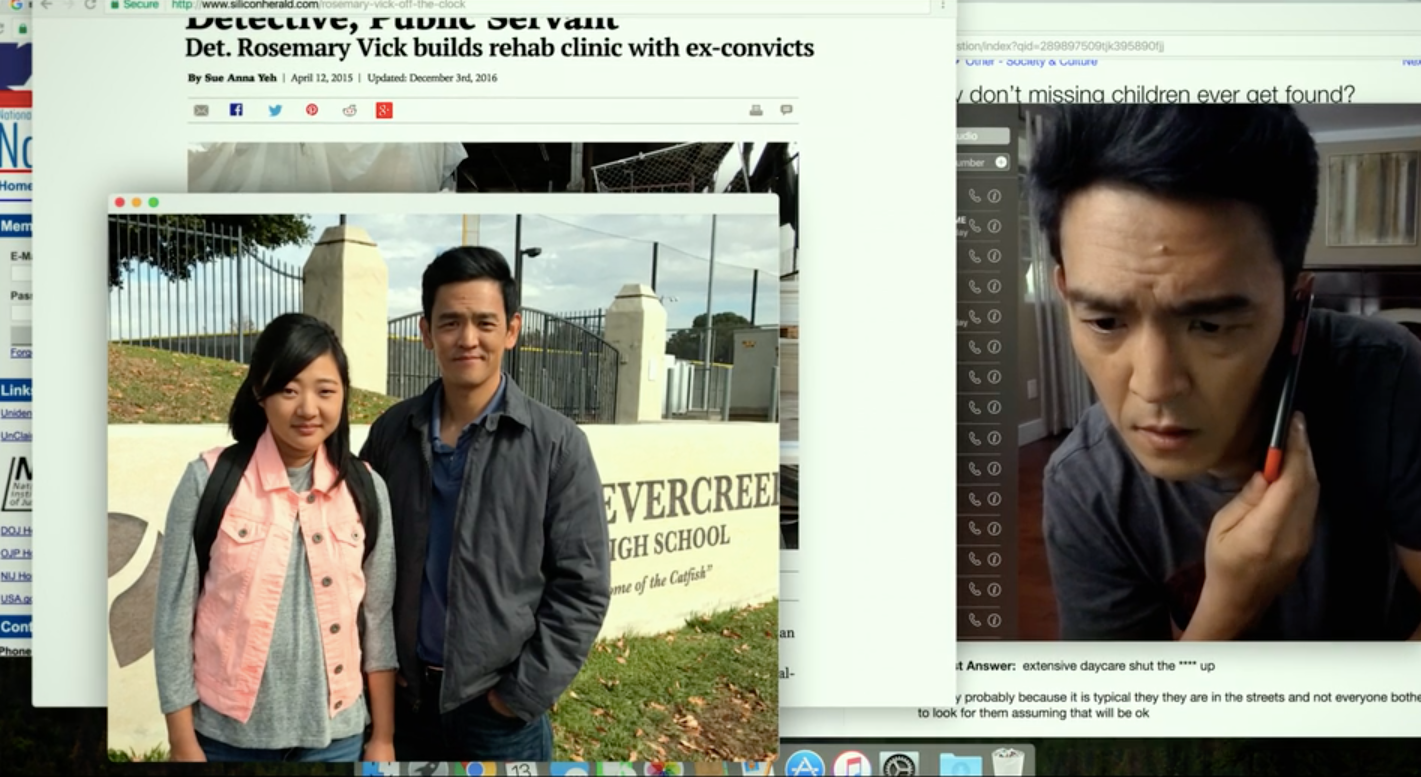This summer movie season ends with two small thrillers about families torn apart. One, Searching, apes the great Unfriended's all-on-a-screen style, at the behest of that film's producer Timur Bekmambetov, to middling effect. It tries hard, but is less committed to the bit. First-time feature writer-director Aneesh Chaganty, heretofore helming some Google commercials, doesn't have a scenario that lends itself to the technology. It's an agonizingly conventional missing-person thriller with a few weak twists and a slowly developed simple expression of exposition. High school sophomore Margot (Michelle La) isn't answering her father (John Cho) despite numerous texts and calls when she first doesn't return home from a study group and later doesn't show up at school for her exams. What's a guy to do, but dig into her digital past while a bland detective (Debra Messing) calls and emails him updates? Rather than creating a movie in which the technology of cams and clicks is integral to the plot, I kept wondering why scenes were composed and contorted to excuse keeping its characters in that frame. This makes it more conventional than Unfriended, and more unsatisfying, as it's pushy, leading the audience by the nose, zooming and panning, cutting between devices, contriving reasons to keep characters connected no matter how improbable. The cast of characters are people who FaceTime more than probably anyone in the world. Why would the daughter's Facebook friends take FaceTime calls from her dad? Why would a police detective working a missing person case answer a video call from the worried parent in the middle of the night? We see her pulling a coat on and waving her pajama-clad son away as she races out the door. Is this scene materially helped by the style? No. But the friction just barely makes a bad scene passable nonetheless. Here we have style just barely, fleetingly propping up a story that’d be completely preposterous if told conventionally. A story of how alienating digital detritus can be, how deceptive, misleading, incomplete a picture it creates, is a glimmer of a good idea, but it's so underwritten and thinly drawn that only its glancing mood connection to those Year-in-Search Google ads' stupidly effective sentimentality keeps its card scam shuffle of a story afloat. (The Big Twist's game is up super early if you notice the girl's high school’s mascot and later apply Ebert's Law of Economy of Characters.) Puncture that, and all you have is the terrific Cho — rage and fear wrestling in most despairing glowers — doing heroic work nearly single-handedly saving a movie so misconceived.
A better debut feature about broken family (and interactions with technology, sort of) is Jonathan and Josh Barker's Kin, a little movie that's slippery about genre, but admirably sturdy about character. It starts as a slice-of-Detroit-life, with a troubled middle schooler (Miles Truitt) suspended on the eve of his adopted father (Dennis Quaid) welcoming troubled older son (Jack Reynor) home from prison. That the boy happened to find a futuristic ray gun in an abandoned warehouse he was scouting for scrap metal is the least of his problems. Soon, though, it is apparent his brother may be out of lockup, but he's still trapped in old bad decisions. Trying to get out from under debt to a menacing low-level gangster (James Franco), a scam goes sideways, and the two brothers end up on the run, as a frosty Michigan crime story becomes a languid road movie prickly with the tension of wondering when the older brother's past will literally catch up to them and if the younger brother will learn the truth of their situation. And there's still the laser cannon — Chekhov's ray gun? There's a double reference to all you English major Trekkers out there — hiding in the kid's duffle bag. Unbeknownst to our hero, two future (or interdimensional or extraterrestrial or something) soldiers have stepped out of a portal and are looking for it. All this and a stripper-with-a-heart-of-gold (Zoe Kravitz, warmly humanizing a stock role)? There's a lot going on in Daniel Casey's script that's somehow on a clean, simple, derivative arc and still sometimes slipping away from expectations. Partly, for all the genre frippery powering the plot engine and crowding the margins of scenes that build to suitably tense thriller sequences, it keeps the focus tightly on its brotherly leads and their unsteady relationship. Especially vivid and sympathetically drawn is the interior life of its young star. His insecurities are plainly written on his face, his struggle to live up to his father's supremely moral example etched in every decision, the seduction of a powerful weapon as a way for an isolated boy to wrest false control over a chaotic life sharply displayed, and the ultimate catharsis of deus ex machina self-discovery some kind of cockeyed moving. Even if I didn't entirely believe the mechanics that bring about the conclusion — if you see it, know I asked myself in the moment if any of Franco's gangs actions in the film's second half ring true — the journey was still basically satisfying, textured with enough beautifully photographed character detail to keep me involved.



No comments:
Post a Comment